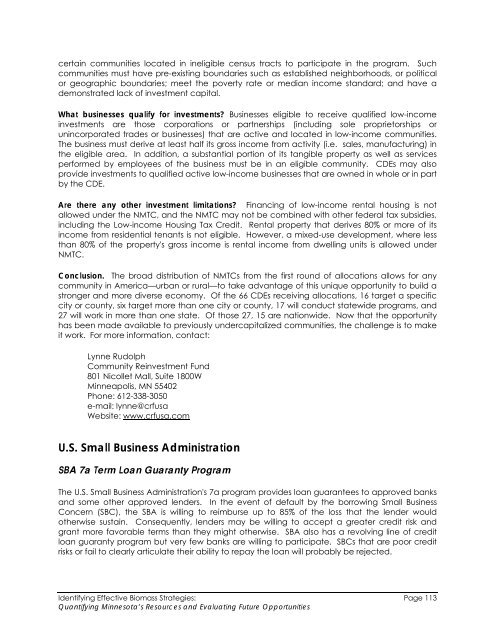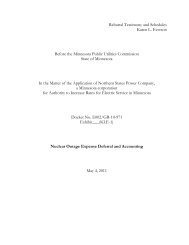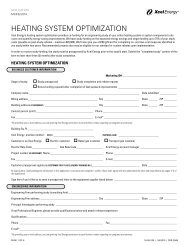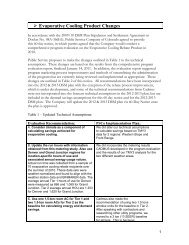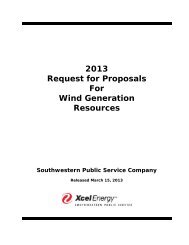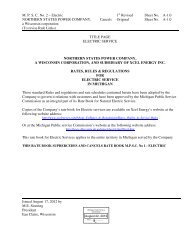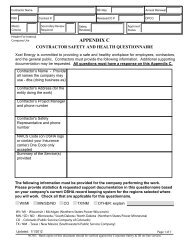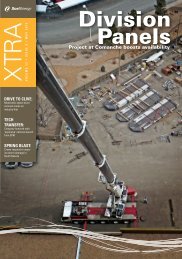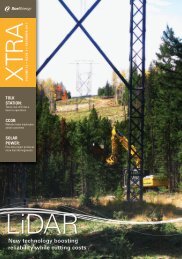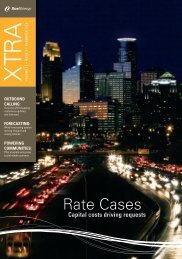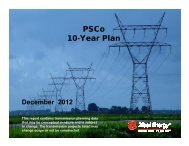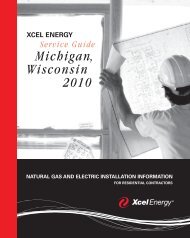Biomass Feasibility Project Final Report - Xcel Energy
Biomass Feasibility Project Final Report - Xcel Energy
Biomass Feasibility Project Final Report - Xcel Energy
You also want an ePaper? Increase the reach of your titles
YUMPU automatically turns print PDFs into web optimized ePapers that Google loves.
certain communities located in ineligible census tracts to participate in the program. Such<br />
communities must have pre-existing boundaries such as established neighborhoods, or political<br />
or geographic boundaries; meet the poverty rate or median income standard; and have a<br />
demonstrated lack of investment capital.<br />
What businesses qualify for investments Businesses eligible to receive qualified low-income<br />
investments are those corporations or partnerships (including sole proprietorships or<br />
unincorporated trades or businesses) that are active and located in low-income communities.<br />
The business must derive at least half its gross income from activity (i.e. sales, manufacturing) in<br />
the eligible area. In addition, a substantial portion of its tangible property as well as services<br />
performed by employees of the business must be in an eligible community. CDEs may also<br />
provide investments to qualified active low-income businesses that are owned in whole or in part<br />
by the CDE.<br />
Are there any other investment limitations Financing of low-income rental housing is not<br />
allowed under the NMTC, and the NMTC may not be combined with other federal tax subsidies,<br />
including the Low-income Housing Tax Credit. Rental property that derives 80% or more of its<br />
income from residential tenants is not eligible. However, a mixed-use development, where less<br />
than 80% of the property's gross income is rental income from dwelling units is allowed under<br />
NMTC.<br />
Conclusion. The broad distribution of NMTCs from the first round of allocations allows for any<br />
community in America—urban or rural—to take advantage of this unique opportunity to build a<br />
stronger and more diverse economy. Of the 66 CDEs receiving allocations, 16 target a specific<br />
city or county, six target more than one city or county, 17 will conduct statewide programs, and<br />
27 will work in more than one state. Of those 27, 15 are nationwide. Now that the opportunity<br />
has been made available to previously undercapitalized communities, the challenge is to make<br />
it work. For more information, contact:<br />
Lynne Rudolph<br />
Community Reinvestment Fund<br />
801 Nicollet Mall, Suite 1800W<br />
Minneapolis, MN 55402<br />
Phone: 612-338-3050<br />
e-mail: lynne@crfusa<br />
Website: www.crfusa.com<br />
U.S. Small Business Administration<br />
SBA 7a Term Loan Guaranty Program<br />
The U.S. Small Business Administration's 7a program provides loan guarantees to approved banks<br />
and some other approved lenders. In the event of default by the borrowing Small Business<br />
Concern (SBC), the SBA is willing to reimburse up to 85% of the loss that the lender would<br />
otherwise sustain. Consequently, lenders may be willing to accept a greater credit risk and<br />
grant more favorable terms than they might otherwise. SBA also has a revolving line of credit<br />
loan guaranty program but very few banks are willing to participate. SBCs that are poor credit<br />
risks or fail to clearly articulate their ability to repay the loan will probably be rejected.<br />
Identifying Effective <strong>Biomass</strong> Strategies: Page 113<br />
Quantifying Minnesota’s Resources and Evaluating Future Opportunities


